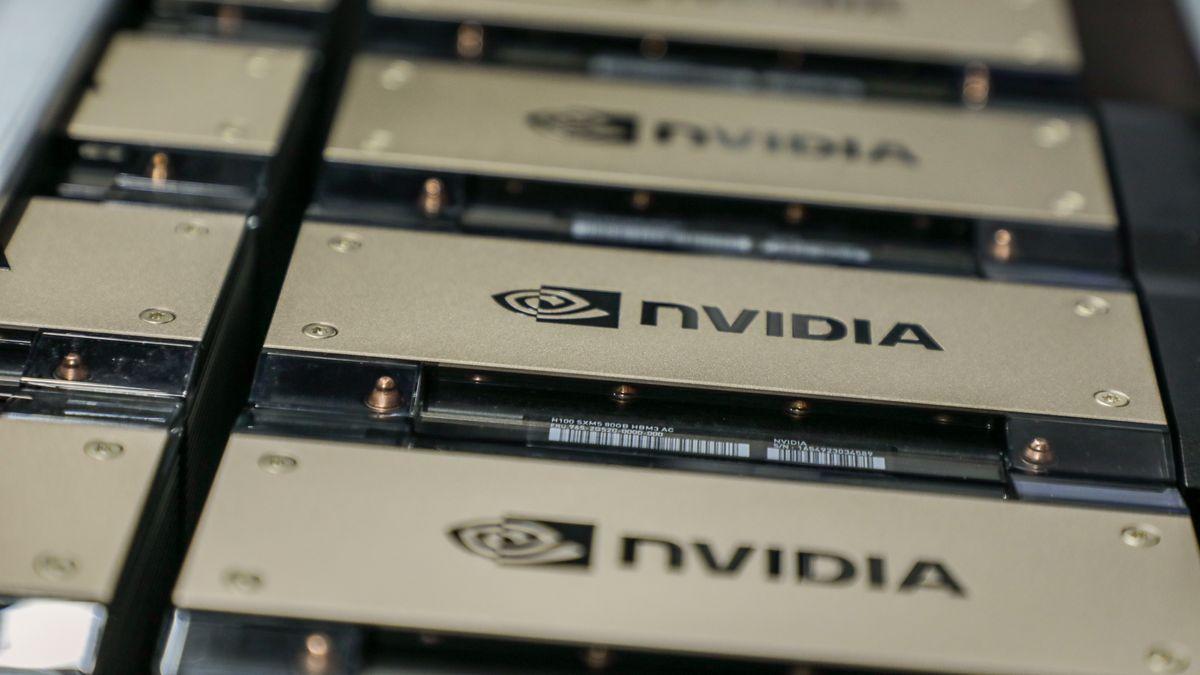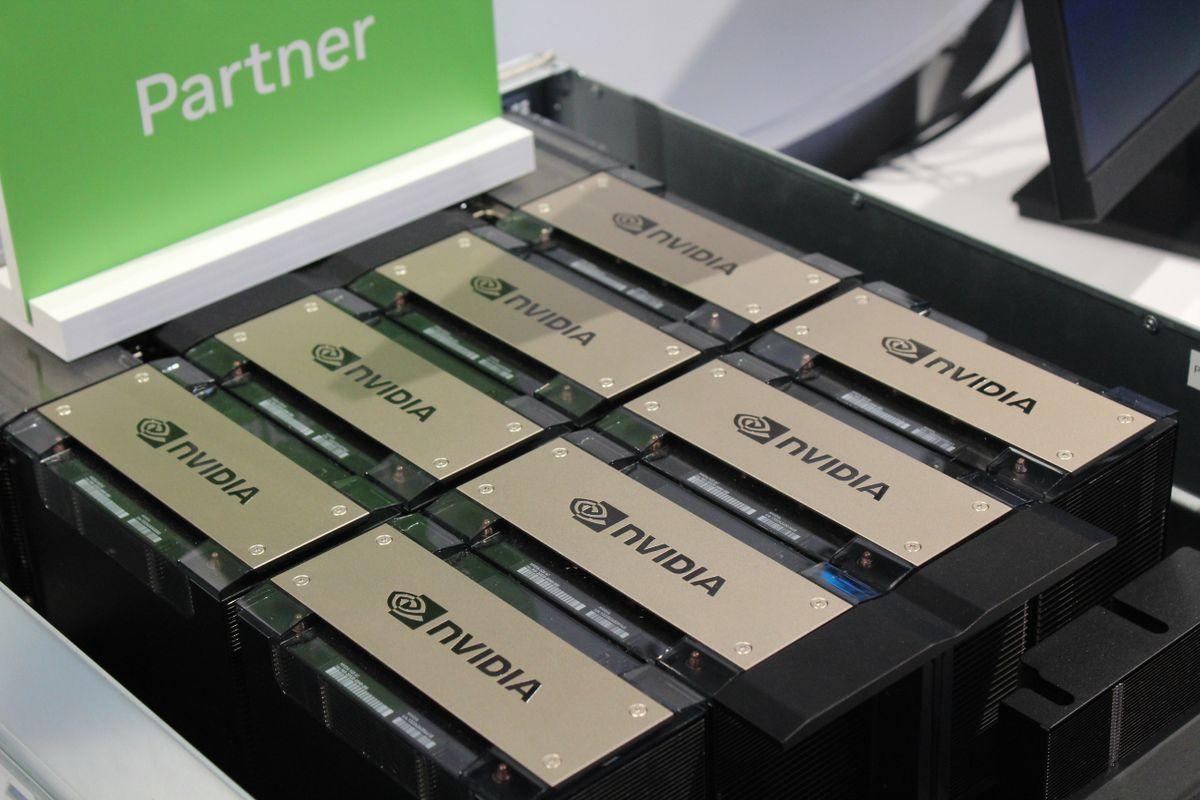AI Startups Secure Billions in Loans Using NVIDIA GPUs as Collateral
3 Sources
3 Sources
[1]
Startups are using Nvidia's AI GPUs as collateral to secure loans of up to $10 billion from financial institutions
If you've ever claimed your hot new piece of gaming hardware was an investment, then this story is for you. Companies are using Nvidia's AI GPUs as collateral in deals with banks to borrow billions of dollars to further their businesses. This means even financial institutions are willing to recognise the potential value of these cards, which must be doing wonders for Nvidia's stock. Fluidstack is a cloud startup company based in London that's just managed to score over $10 billion in funding according to a report by The Information (via WCCFtech). The company was able to leveridge its currently held supply of Nvidia AI GPUs to secure the loan from multiple financers including Macquarie. This model of putting cards up for collateral Fluidstack is using isn't unique. CoreWeave, a cloud AI service which just received a massive influx of high-powered Nvidia AI Blackwell Ultra racks, was one of the pioneers of this loan structure. It was able to secure up to $9.9 billion dollars by putting its Nvidia H100 AI GPUs against the loan. Supposedly it used some of that cash to secure this new shipment of hardware, which points at a weird cyclical loan arrangement. Buy some cards, get a loan against them, buy more. Repeat. Profit? Given how fast this tech depreciates, it seems surprising financial institutions are willing to put loans against them. There are even rumours the collateral chips are held under lock and key, so they aren't even creating value through use. Still, if they're able to secure such wads of cash in loans maybe Nvidia's AI GPUs are worth even more locked away in a drawer then they are doing actual work. This also raises questions around what happens to these GPUs down the line. If the startups using these loans fall through its presumed they'll be sold to recap any losses for the loaning parties. And will these banks do this before they lose value and are superseded by the next piece of kit. Given the high prices of these loans there has to be a hefty amount of units backing this. One failed startup could lead to a weird market flooded with high-end AI cards. It all seems like a risky venture, but if banks are willing to put this much money down there must be significant confidence in the value of these cards. Hopefully all this profit for Nvidia will lead to more gaming cards at reasonable prices, you know other than the RTX 5060 TI 8GB appearing. A girl can dream.
[2]
NVIDIA AI GPUs used as collateral for loans, startup secures $10B in funding with AI chips
NVIDIA AI GPUs are being used as collateral, with a UK-based AI startup using its NVIDIA AI GPUs to secure a huge $10 billion loan. As an Amazon Associate, we earn from qualifying purchases. TweakTown may also earn commissions from other affiliate partners at no extra cost to you. NVIDIA AI GPUs are being used as collateral for huge loans, with UK-based startup Fluidstack using its arsenal of NVIDIA AI chips to secure over $10 billion in loans. In a new report from The Information picked up by insider @Jukanrosleve on X, we're hearing that in the past CoreWeave pioneered a new financial model by raising $9.9 billion in funding through GPU-backed financing to purchase AI chips and leasing them out to clients including OpenAI, effectively "paying off debt with GPUs". Led by CoreWeave, multiple AI cloud computing startups are expanding their financing using high-performance AI chips as collateral, with the total loan volume exceeding $20 billion. However, there are potential risks involved with this financing model because of the short product lifecycle of NVIDIA GPUs which sees the AI chips depreciating rather quickly. London-based AI startup Fluidstack was founded back in 2017 and has revenues of $65 million in 2024, but expects to see a huge injection of revenue of over $400 million in 2026. Fluidstack provides chip leasing services to clients including France's Mistral AI and Germany's Black Forest Labs, but they're also in talks with Goldman Sachs and JPMorgan for potential debt financing. Fluidstack is now drawing funds from lenders as required, and might not borrow the entire approved amount, with key challenges from financial institutions is "how long the value of NVIDIA GPUs can be maintained". NVIDIA has been reducing the development cycle of its AI GPUs, which increases the risk that the value of existing AI GPUs would depreciate quicker. CoreWeave estimates that the useful life of AI GPUs is around 6 years, but the acceleration of AI GPU product cycles could lead to much faster depreciation, which raises concerns about a decline in collateral value. Investors are now demanding high interest rates and strong collateral decisions to protect themselves. There are some companies that are attempting to use AI GPUs that aren't from NVIDIA, including AMD, as collateral assets in order to diversify their risk. Startup TensorWave is looking at debt financing that's backed by AMD chips, which The Information reports that this would be one of the precedent-setting cases for AMD AI chips as collateralized financing.
[3]
NVIDIA's AI Chips Are Reportedly Being Used as Collateral for Loans, With a Startup Securing a Whopping $10 Billion Through Accelerators
Well, it seems like buying NVIDIA's AI chips could earn even more money in loans, as a new financial model now allows AI startups to put their GPUs as collateral. The AI bandwagon is definitely up and running, and in all the frenzy, companies are apparently spending billions on hardware and software to cater to the demand coming from the market. With finances getting suck up in the hype, it seems like a new window has opened up for AI companies to apparently get "billions of dollars" by putting their AI accelerators as a collateral for loans. In a report by The Information, a London-based cloud startup Fluidstack has managed to get over $10 billion in funding from financial institutes like Macquarie, showing that NVIDIA's AI GPUs have now real value in the financial markets. According to the report, this model was initially adopted by Coreweave, a company that NVIDIA backs in investments and hardware. In simple terms, Coreweave got chips from NVIDIA like the H100 AI GPUs, which were used to secure loans of up to $9.9 billion through GPU-backed financing. With the funding, Coreweave might have decided to buy new accelerators, and the bandwagon keeps on going in circles. Interestingly, some reports claimed that AI GPUs are kept as collateral under some sort of "lock boxes", where they are held as assets until debt payment is completed. NVIDIA has sold hundreds of billions of dollars worth of AI chips to the market, and despite that, they remain scarce. Their use case, followed by how difficult they are to get, might be one of the ways financial institutions see AI GPUs as the right thing to put collateral in loans. However, there's a risk with this economic model, which is the depreciation of AI accelerators, following NVIDIA's new releases. The market moves towards a newer variant, and the older ones will drop quickly in pricing, which is something lenders see as a risky factor. Another interesting thing is that if startups fail to keep up with their debt payments, the "collateral" AI chips might get flooded into the markets, which would be a tough situation for NVIDIA and supply chain partners to deal with. Seeing GPUs as security assets is indeed a controversial move, but given how important AI computing has become in the modern-day world, it might be a worthwhile venture for lending institutions. But before I complete, remind me what MicroStrategy (MSTR) does in the comment section below.
Share
Share
Copy Link
AI startups are leveraging NVIDIA's AI GPUs as collateral to secure massive loans from financial institutions, with one company obtaining over $10 billion in funding. This new financial model raises questions about the long-term value and risks associated with using rapidly depreciating technology as loan security.
AI Startups Leverage NVIDIA GPUs for Billion-Dollar Loans
In a groundbreaking financial trend, AI startups are using NVIDIA's artificial intelligence GPUs as collateral to secure substantial loans from financial institutions. This innovative approach has led to companies like Fluidstack, a London-based cloud startup, obtaining over $10 billion in funding from financiers including Macquarie
1
2
.
Source: TweakTown
The GPU-Backed Financing Model
The concept of using AI chips as loan collateral was pioneered by CoreWeave, a cloud AI service that secured up to $9.9 billion by leveraging its NVIDIA H100 AI GPUs
1
. This model has since been adopted by other AI cloud computing startups, with the total loan volume exceeding $20 billion2
.The process involves companies purchasing NVIDIA AI GPUs, using them as collateral for loans, and then potentially using the borrowed funds to acquire more hardware. This cyclical arrangement has raised eyebrows in the financial and tech sectors, given the rapid depreciation of such technology
1
.
Source: PC Gamer
Financial Institutions' Perspective
Despite the inherent risks, financial institutions appear willing to recognize the potential value of these AI accelerators. The confidence in NVIDIA's AI GPUs is evident from the substantial loan amounts being approved. However, lenders are also implementing protective measures:
- High interest rates are being demanded to offset risks
2
. - Strong collateral decisions are being made to protect investments
2
. - Some reports suggest that collateralized GPUs are kept in "lock boxes" until debt payment is completed
3
.
Related Stories
Risks and Challenges
The primary concern with this financing model is the rapid depreciation of AI hardware. NVIDIA's frequent product cycles mean that existing GPUs can quickly lose value, potentially compromising the collateral's worth
2
. Other challenges include:- The estimated useful life of AI GPUs is around 6 years, but accelerated product cycles could lead to faster depreciation
2
. - If startups fail to meet debt obligations, a flood of high-end AI cards could hit the market, potentially disrupting NVIDIA's pricing strategy
1
3
. - The practice of holding GPUs under lock and key prevents them from creating value through active use
1
.
Market Diversification and Future Outlook

Source: Wccftech
To mitigate risks, some companies are exploring the use of non-NVIDIA AI GPUs as collateral. For instance, startup TensorWave is considering debt financing backed by AMD chips, which could set a precedent for diversifying collateralized AI hardware
2
.As this trend continues to evolve, it highlights the immense value placed on AI computing in today's market. However, it also underscores the need for careful consideration of the long-term implications of using rapidly depreciating technology as loan security in an ever-changing tech landscape.
References
Summarized by
Navi
[2]
Related Stories
Nvidia's $1 Billion AI Investment Spree in 2024: Opportunities and Challenges
02 Jan 2025•Business and Economy

Nvidia's AI Dominance Faces Challenges as Scaling Laws Show Signs of Slowing
21 Nov 2024•Technology

Nvidia Strikes $1.5 Billion Deal to Lease Back Its Own AI Chips from Cloud Startup Lambda
06 Sept 2025•Technology

Recent Highlights
1
ByteDance's Seedance 2.0 AI video generator triggers copyright infringement battle with Hollywood
Policy and Regulation

2
Demis Hassabis predicts AGI in 5-8 years, sees new golden era transforming medicine and science
Technology

3
Nvidia and Meta forge massive chip deal as computing power demands reshape AI infrastructure
Technology





